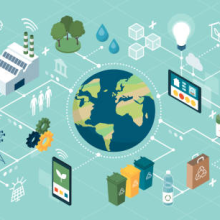It’s Easy To Be Cynical: Green and Sustainability
As green and sustainability issues continue to dominate the news cycle, it’s easy to become cynical about their impact.
Many people feel that their individual actions can’t make a difference, while others believe that businesses and governments aren’t doing enough to tackle these pressing issues.
However, it’s important to remember that every action counts, no matter how small.
By making changes to our own lives and supporting collective movements, we can all contribute to a more sustainable future.

I. Individual Actions
Reducing energy consumption: One of the easiest ways to reduce your carbon footprint is to reduce your energy consumption.
Simple changes such as switching to energy-efficient light bulbs, turning off lights and electronics when not in use, and using natural light whenever possible can all make a difference.
Sustainable transportation: Transportation is a significant contributor to greenhouse gas emissions.
By choosing more sustainable options such as walking, cycling, carpooling, or using public transportation, you can reduce your impact on the environment.
Sustainable products: Another way to support sustainability is by choosing products that are environmentally friendly.
Look for items made from sustainable materials, with minimal packaging, and that are designed to last.
II. Collective Movements
Environmental organizations: There are numerous environmental organizations working to protect the planet and promote sustainability.
From local grassroots groups to international NGOs, these organizations offer opportunities to get involved and make a difference.
Consider volunteering your time or donating to support their efforts.
Green initiatives by businesses: Many businesses are recognizing the importance of sustainability and are taking steps to reduce their impact on the environment.
Check here on why executive pay is now being linked to ESG Goals
By supporting these businesses, you can help to drive change in the industry and encourage others to follow suit.
Government policies and regulations: Governments play a critical role in promoting sustainability.
From setting emissions targets to providing incentives for sustainable practices, policy and regulation can have a significant impact on the environment.
Make your voice heard by contacting your elected representatives and advocating for policies that support sustainability.
III. Benefits of Green and Sustainability
Economic benefits: Investing in sustainability can have significant economic benefits.
By reducing waste and energy consumption, businesses can save money on operational costs.
In addition, sustainable industries such as renewable energy and green technology are rapidly growing, providing new job opportunities and contributing to economic growth.
Environmental benefits: The benefits of sustainability for the environment are clear.
By reducing carbon emissions and promoting sustainable practices, we can protect the planet for future generations.
This includes preserving natural habitats, reducing pollution, and protecting wildlife.
Social benefits: Sustainability also has important social benefits.
By promoting sustainable practices, we can improve public health, create safer communities, and promote social justice.
For example, sustainable agriculture practices can help to provide food security and reduce hunger.
IV. Challenges to Green and Sustainability
While the importance of green and sustainability practices is increasingly recognized, there are still several challenges that need to be addressed to drive meaningful change.
One of the significant challenges to sustainability is misinformation.
There is a lot of conflicting information about sustainability practices, and it can be challenging to know which actions are most effective.
This can lead to confusion and apathy, making it difficult to motivate people to act.
To overcome this challenge, it is essential to seek out reliable sources of information and educate oneself on the issues.
Another challenge to sustainability is resistance from industries. Many industries have been slow to adopt sustainable practices, often due to concerns about costs or a lack of awareness.
Industries such as agriculture, transportation, and energy production contribute significantly to greenhouse gas emissions and other environmental issues.
To overcome this resistance, it is crucial to support businesses that are taking steps toward sustainability and advocate for change.
This can include supporting policies that incentivize sustainable practices and consumer choices that prioritize sustainability.
A lack of awareness about the importance of sustainability can also be a significant barrier to progress.
Many people still do not understand the urgency of the situation or the benefits of acting. Raising awareness about the benefits of sustainability and the importance of individual action can inspire others to get involved and create positive change.
This can be done through education campaigns, community outreach, and public events.
In addition to these challenges, there are also practical obstacles to sustainability, such as the availability and affordability of sustainable products and services.
Addressing these challenges will require collaboration and innovation across sectors and industries.
Despite the challenges that exist, the need for sustainability is clear, and the benefits of sustainable living are numerous and far-reaching.
By working together and acting today, we can create a brighter, more sustainable future for ourselves and future generations.
V. Conclusion
It’s easy to be cynical about green and sustainability issues, but we all have the power to make a difference.
By taking individual actions and supporting collective movements, we can create positive change and contribute to a more sustainable future.
We can reduce our energy consumption, support eco-friendly businesses, and advocate for policies that promote sustainability.
We can also educate ourselves and others about the importance of protecting our planet and its resources.
Remember, green and sustainability issues are not just about saving the planet for future generations; they are also about creating a healthier and more prosperous present.
By working together, we can build a more sustainable world that benefits everyone. So let’s take that first step and start making a difference today.
As author and activist, Margaret Mead said, “Never doubt that a small group of thoughtful, committed citizens can change the world; indeed, it’s the only thing that ever has.”
Let’s be those committed citizens and do our part to make the world a better place for ourselves, our communities, and our planet.
References
- The Environmental Defense Fund. (2022). Climate. Retrieved from https://www.edf.org/climate
- The United Nations Environment Programme. (2022). Sustainability. Retrieved from https://www.unep.org/sustainability
- The Nature Conservancy. (2022). Our Work. Retrieved from https://www.nature.org/en-us/about-us/what-we-do/
- The World Wildlife Fund. (2022). What We Do. Retrieved from https://www.worldwildlife.org/what-we-do
- The Natural Resources Defense Council. (2022). Our Work. Retrieved from https://www.nrdc.org/our-work
- The Global Reporting Initiative. (2022). Sustainability Topics. Retrieved from https://www.globalreporting.org/sustainability-topics/
- The Climate Group. (2022). Our Impact. Retrieved from https://www.theclimategroup.org/our-impact
- The Sustainability Accounting Standards Board. (2022). Our Standards. Retrieved from https://www.sasb.org/standards/overview/


